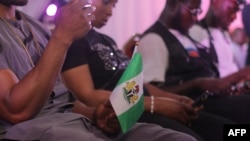Activists in Nigeria say despite widespread protests two years ago against the police’s controversial Special Anti-Robbery Squad (SARS), police brutality in the country is far from gone.
On Thursday, hundreds gathered at the Lekki toll gate in Lagos to hold a memorial procession for protesters killed there on October 20, 2020, but said police operatives still tried to forcefully disperse them.
Saondo Orshio was one of the protesters two years ago in the capital, Abuja, seeking an end to what critics called systemic police brutality. The Lagos shootings halted those protests.
Orshio said he has been constantly harassed by agents since then, with the most recent incident occurring about three months ago.
"I remember very well after the End SARS [protests], I still encountered police brutality," he said. "With a friend, a policeman approached us and seized our phones and said we are fraudsters and that we should settle [with] him or he's going to take us to their office. And made a comment that he's going to destroy our careers."
The SARS unit was notorious for arresting people on questionable grounds and extorting, beating and killing those it took into custody.
The Lekki toll gate shooting has become historic in Nigeria, and for many protesters like Lagos-based lawyer Kennethcollins Ajagu, it bears the hallmark of pain and injustice.
Amnesty International said up to 12 protesters were killed by Nigerian security forces at the toll gate and that many other deaths were reported nationwide.
Nigerian authorities set up investigative panels to look into claims of brutality and to compensate victims. But not everyone has been compensated.
Ajagu said he was lucky to leave the venue when he did.
"The day the killing happened, I was there till around 12 in the afternoon," he said. "Before I left, it was still a peaceful thing; everyone just gathered, music was being played. Considering what has happened, everyone is still traumatized."
On Thursday, hundreds of End SARS protesters converged at the toll gate to remember those killed there and hold a procession as a sign of respect. But they said heavily armed police fired tear gas to disperse the procession.
Police have not responded to the claims, and national police spokesperson Muyiwa Adejobi did not take calls for comment.
But human rights activist Aisha Yesufu said it showed the high level of impunity by officials.
"I went online, and the first thing I see is that people who had gone to commemorate the day were being tear-gassed by the police," Yesufu said. "It just shows how much regard they have for citizens. They don't care."
The Nigerian government announced the disbandment of SARS many times in the past, including in the wake of the protests of October 2020. But it’s hard for many citizens like Orshio and Ajagu to believe the squads no longer exist.







